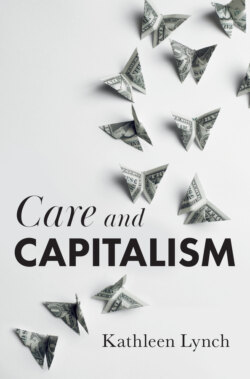Читать книгу Care and Capitalism - Kathleen Lynch - Страница 21
Neoliberal Capitalism, Inequality and Care
ОглавлениеAlthough there is a danger in making capitalism the centre of all meaning-making when framing the politics of social justice (Gibson-Graham, Cameron and Healy 2016), the sociological reality is that neoliberal capitalism exercises a pervasive influence on social thought. It observes and locates people via mobile phones, credit cards and satellites; it exercises control over tastes and preferences through subliminal advertising, mediates communication and measures and records movement, all for the purposes of profit-making (Zuboff 2019). Even if its influence is indirect, the world is governed by its precepts. What makes capitalism so powerful is that it is deeply embedded historically. Its ecology and values shaped the modern nation state through force and coercion, as well as through enticement and consent (Graeber 2011; Patel and Moore 2018).5 In its neoliberal form, capitalism is culturally pervasive and ideologically ingrained in major media, educational, cultural and recreational institutions (McGuigan 2010). While it is contested intellectually, it exercises an ideological hegemony that is very difficult to undermine (Leyva 2019).
Neoliberal capitalism is also institutionally hegemonic in the politics and economy of global life. It has been embedded and legitimated through the diffusion and enforcement of its principles in debtor countries in South America (Kentikelenis and Babb 2019), and more recently, with the support of the European Central Bank and the European Commission, within Europe (Kalaitzake 2017; Storey 2019). While the scope, scale and form of inequality arising from capitalism vary over time and with the politics of particular jurisdictions (Hall and Soskice 2001; Streeck 2016), since the 1980s advanced capitalist economies have, to a greater or lesser degree, been reorganized to reflect a distinctly neoliberal and deeply inegalitarian-led model of socio-economic (re-)production. Social class polarizations have grown, with income inequality increasing rapidly in North America, China, India and Russia since 1980, and growing moderately in Europe also during that period (Alvaredo, Chancel, Pikettty, Saez and Zucman 2018). The rise of wealth and income concentration at the top of so many national economies takes ‘oligarchic’ forms with high concentrations of wealth in family networks. The rich have become so rich that they perceive the fate of themselves and their families ‘to be independent of the fate of the societies where they extract their wealth’ (Streeck 2016: 28–9).
Upper-class detachment is paralleled by the rise of middle-class and working-class insecurities in a precarious working environment in Western democracies (Standing 2011). Fear of losing class privileges and related securities is heightened with the rise of precarious work among the previously secure middle classes (Mau 2015). The detachment of the super-rich and the exacerbation of middle-class insecurities have created a strong bulwark against promoting solidarity and care within welfare states in Europe (Frericks 2010).
